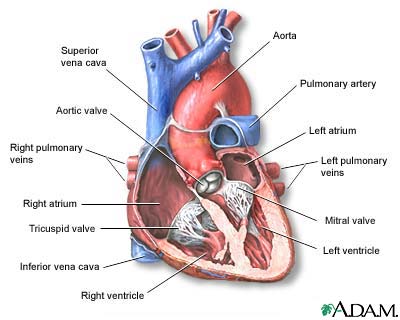Treatment
Ventricular fibrillation is a medical emergency and must be treated immediately to save a person’s life.
If a person having a VF episode collapses at home or becomes unconscious, call the local emergency number (such as 911).
While waiting for help, place the person’s head and neck in line with the rest of the body to help make breathing easier. Start CPR with mouth-to-mouth breathing and chest compressions. Continue to do this until the person becomes alert or help arrives.
The emergency medical team will quickly examine the person while continuing CPR. The person will be taken to the hospital.
VF is treated by delivering a quick electric shock through the chest using a device called an external defibrillator. The electrical shock can immediately restore the heartbeat to a normal rhythm.
Medicines may be given to control the heartbeat and heart function. People with heart muscle damage may need additional procedures, including a heart transplant.
A cardiologist will look for potential causes of the VF.
An implantable cardioverter defibrillator (ICD) may be recommended for those who survive a VF attack and are at risk for future ones. The ICD can help prevent sudden cardiac death.
Moderate hypothermia therapy may be used on people who remain in a coma after treatment. This involves keeping the person slightly below normal body temperature for several hours. Such therapy has been shown to improve the outcome and reduce death.
Prognosis (Expectations)
VF can lead to death within a few minutes or a few days. The survival rate for a person who has a VF attack outside the hospital ranges between 2% and 25%.
Complications
The most common complication of VF is sudden death (death that occurs within 1 hour after symptoms started).
For survivors of VF, complications include:
- Coma
- Nerve problems similar to those after a stroke
- Reduced mental perception
Calling Your Health Care Provider
Call 911 if someone shows signs of VF.
Pictures & Images
Heart, section through the middle
-
Ventricular fibrillation: Overview, Causes
-
Ventricular fibrillation: Symptoms & Signs, Diagnosis & Tests
-
Ventricular fibrillation:Treatment
Review Date : 5/15/2008
Reviewed By : Alan Berger, MD, Assistant Professor, Divisions of Cardiology and Epidemiology, University of Minnesota, Minneapolis, MN. Review provided by VeriMed Healthcare Network. Also reviewed by David Zieve, MD, MHA, Medical Director, A.D.A.M., Inc.
